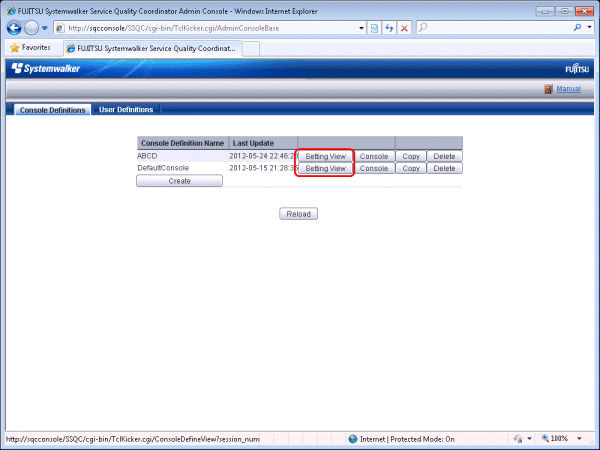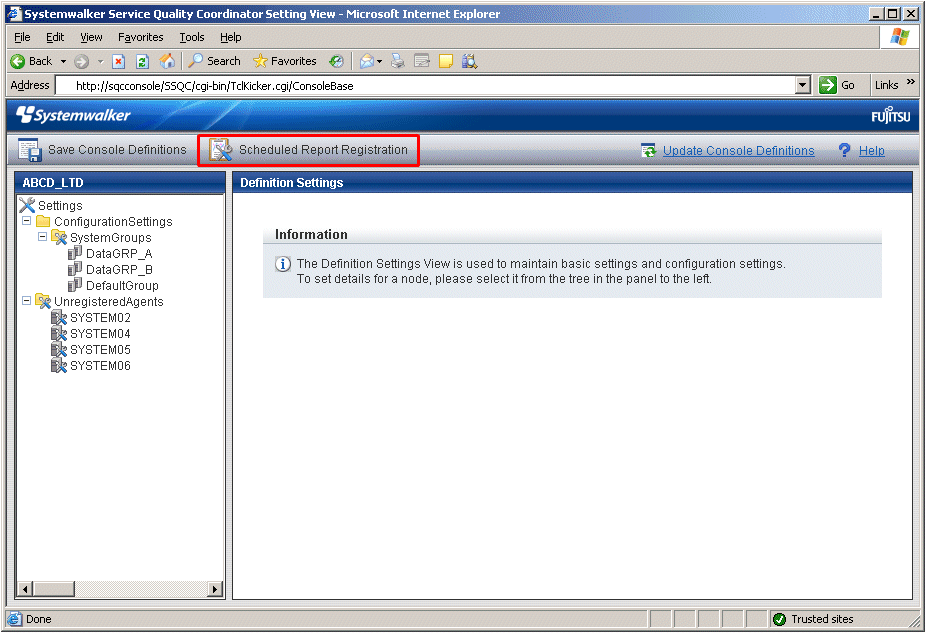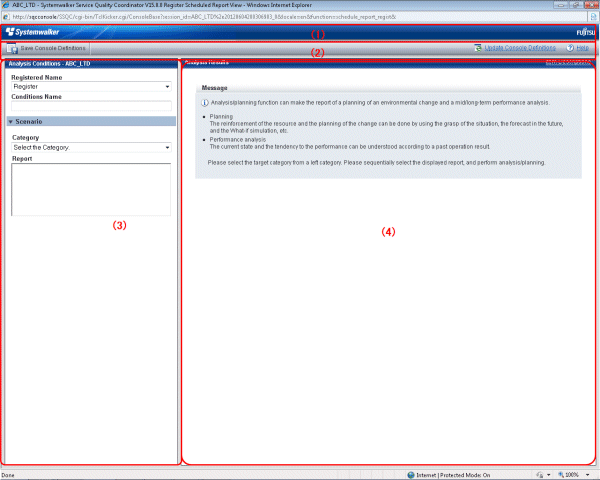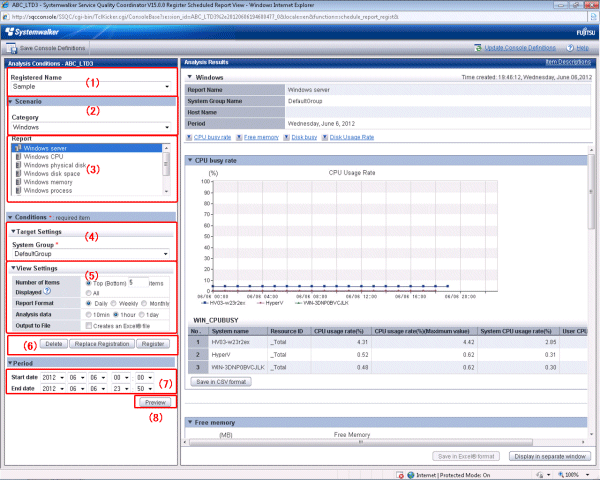This section explains how to use the Scheduled Report Registration view for registering scheduled reports.
Note
The following problems sometimes occur when users try to display the desired contents (graphs or tables).
The operation terminates with error code 1572864.
"Chart is unavailable" is displayed instead of the graph image.
The graph image may be left out (only graphs are not displayed).
The following error message may be displayed.
"The specified CGI application misbehaved by not returning a complete set of HTTP headers. The headers it did return are: Unable to register TclNotifier window class" "ohd_update error." "Ohd file create error." |
These problems may be due to insufficient space in the desktop heap for the operation management client. Increase the size of the desktop heap by referring to "6.1 Content Display Errors"
Starting the Scheduled Report Registration View
Open the Setting View by clicking the Setting View button on the Console Definitions tab of the Admin Console.

Select Register Scheduled Report menu from the global navigation bar in the Console window.

Note
Do not perform operations in the Scheduled Report Registration View using the pop-up context menu that appears when the right mouse button is clicked.
Configuration of the Scheduled Report Registration View
The Scheduled Report Registration View will appear as below.

The Scheduled Report Registration View is organized as shown in the following table.
Item No. | Component | Description |
|---|---|---|
(1) | Global header | The Systemwalker and Fujitsu logos are displayed. |
(2) | Global navigation bar | The menus are as follows:
|
(3) | Analysis conditions area | Report conditions can be set and registered. |
(4) | Content display area | Each content is displayed. |
Basic operation of the Scheduled Report Registration View
The Scheduled Report Registration View tabs perform the following operation.
Operation | Description |
|---|---|
Register report conditions | Registers any report conditions. Select Register in Registered Report Name and enter a condition name in Category. Enter the required report conditions, then items other than the dates for starting and finishing reports are registered when the Register button is pressed. |
Edit report conditions | Change the content of registered report conditions. Select the condition name to be edited in Registered Report Name. Enter the required report conditions, then items other than the dates for starting and finishing reports are registered when the Save Over Current button is pressed. |
Copy report conditions | Copies the content of registered report conditions. Select the condition name to be copied in Registered Report Name. Enter the required report conditions, then the dialog appears when the Register button is pressed, so enter the condition name and click the OK button. Items other than the dates for starting and finishing reports are registered. |
Delete report conditions | Deletes a registered report condition. Select the condition name to be deleted in Registered Report Name and press the Delete button. |
Test report conditions | Runs a test display to check that the specified report conditions are correct. Refer to "Configuration of the Analysis Conditions area" for details on how to use the Scheduled Report Registration view. |
Register, Edit and Delete scenario | Refer to "Basic operation of Analysis/Planning Window". |
Point
If the registered content of a scheduled report is changed (registered, edited, copied or deleted) using the Scheduled Report Registration View, the Save Console Definitions button on the global navigation bar must be clicked.
There is no need to perform Save Console Definitions if a new scenario is being registered, or if a scenario is being edited or deleted.
Configuration of the Analysis Conditions area

Item No. | Component | Description |
|---|---|---|
(1) | Registered Report Name | A specification relating to the report name. |
(2) | Category | Select a category according to the purpose of operation. |
(3) | Report | Select a report according to the purpose of operation. |
(4) | Target Settings | A specification relating to the analysis target. |
(5) | View Settings | Specifies the data interval, the number of display items for the report and the file output. CPU usage rates etc. are extracted by a high-ranking number to do the high CPU usage rates by the process in the troubleshooting. Available memory capacity is extracted by the low-ranking number to prevent the system down by insufficient memory. The number of data items to display in the report is about up to 10. The graph might collapse by explanatory notes in case of 10 or more. |
(6) | Operation buttons (to register, edit, and delete report conditions) | Buttons for registering, changing, and deleting the report conditions. |
(7) | Period Specifications | Specify the periods for reports. |
(8) | Operation buttons (preview) | Buttons for previewing the report conditions. |